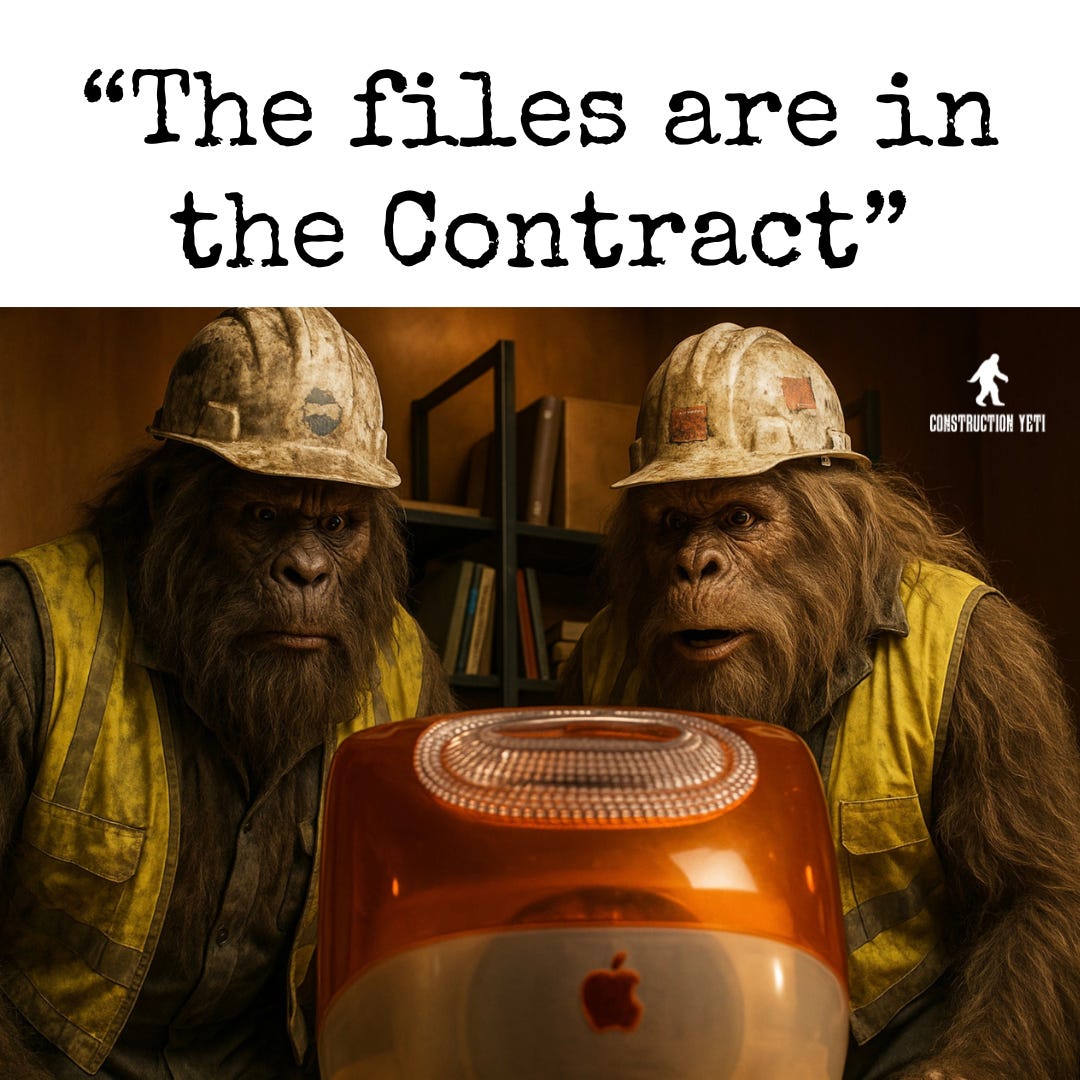Construction Curiosities #123
What Contract Documents are, What they are not, & Some Contract Doc Gotchas
Hey! Happy Sunday! Matt here.
Welcome to the Construction Curiosities newsletter!
Might as well wrap up our 2-month crash course in Procurement & Contracting and talk about what Construction Documents actually are. A simple thing that I see even some of the most seasoned folks get confused on.
Lets roll!
Summary
This week we will look at:
One Musing: What’s in a Contract??!?
One Article: Immigration raids effect on Construction labor
ConTech Corner: FieldProof Help Wanted
One Meme: Arguing over Contract Verbiage
What’s in a Contract?
Everyone knows what’s in a contract, right?
But did you know that the Contract really includes so, so much more?
So what is a Construction Contract, and what are Contract Documents?
CMAA defines Construction Contract Documents as: “The documents which provide the basis for the contract entered into between parties. They typically include the bid documents updated to reflect the agreement between the owner and the contractor(s).”
What Contract Documents are!
Simply put a contract document is a document that is incorporated into the contract by name. These can include:
the Instruction to Bidders
the Contract
the General Conditions
any Supplemental Conditions furnished to the contractor
the drawings
the specifications
any and all Exhibits, Addenda, Bulletins, Reports, ASIs, and Change Orders issued in accordance with the General Conditions
RFIs
Wait… RFI’s are Contract Documents?
Well, I was always taught so… But how are RFI’s contract documents if they are not specifically referenced by name or added via a Change order?
The best explanation I’ve seen is from this very interestingly written AIA article from 2009 entitled, “Shootout at the RFI Corral”
Anyways, back to what Contract Documents are. You’ll notice I said those are “Typical” things. Technically, the contract can include anything and everything. This is why it is of the utmost importance to RTFC. (Read The F’n Contract). And read it thoroughly. (How many times have you heard me say this??? It’s kinda a big deal)
“Send the contract over and I'll have it signed and back to you by the end of the day. I don't need to read it.”
- A Construction Executive for a company that is no longer in business… (true story)
Obviously, it needs to be read and redlined (negotiated) prior to signing, but also by the PM staff to ensure they understand what they are obligated to do/ provide and where their risk lies.
What Contract Documents are not!
It’s simple. Contract documents are not anything that’s not specifically referenced in the contract. This includes:
Submittals
Verbal Conversations
Emails
Text Messages
Proposals
If it was discussed and agreed upon during the proposal and negotiation stage, make sure it is memorialized in the contract; otherwise, it is as if it never happened.
As an Owner’s Rep, I never want to have those conversations twice. So I make sure the scope is tightly defined and all EXCLUSIONS are included. When writing (or negotiating a contract), think about the “Hit by the Bus” principle. “If I were hit by a bus and the next person filled my seat, would they have the necessary documentation to pick up where I left off?”
Gotcha Things
So, what are some gotcha things to keep a lookout for? Here’s a list of some of the things I’ve seen and I’ve also crowd-sourced a few from my LinkedIn friends when I posted this article a couple of years ago.
Anything too broadly defined or open-ended. These things do nothing but lead to fighting, arguing, and potential lawsuits down the road! Be as specific as you can and leave nothing up to interpretation.
BIM Coordination - If you are a subcontractor, will you have a responsibility to participate in the BIM Coordination?
Years ago, I first-hand saw an electrician miss this requirement, and they didn’t plan for it. The GC held them to it, and they had to outsource to a BIM team to complete it for them since they didn’t have the capabilities in-house. They were hemorrhaging money before they even stepped foot on the job site.
Composite Clean-Up Crew - A trend more GCs are jumping onto (to help keep a clean site) is to require each individual sub to provide one laborer to a cleanup crew once a week or so.
Did you bid the job to include this?
If you are a subcontractor, does your subcontract include the GC’s prime contract by reference? Odds are it does, but lots of subs never even ask to see it. It’s your right to get a copy, so ask or tell them to strike the reference out. Never sign anything you can’t see.
Every now and then, there will be a conflict with the Building Codes and the project specifications. Make sure you understand what the adopted codes are in the jurisdiction you are in. Your contract likely says something along the lines that you have to meet the code, whether in the contract documents or not.
Legal jargon that I’m not really qualified to review, and you likely aren’t either. Have your attorney look it over.
Insurance requirements that I’m not really qualified to review, and you likely aren’t either. Have your insurance provider look it over.

What other “gotchas” have you seen out there??
One Article
Immigration raids having chilling effect on Construction Labor
Now STOP 🛑. Before anyone thinks this is a political post. It’s not. I do everything I can to keep my own views and opinions out of the content I put out.
But this news is currently having an impact on our Industry. From the article: “Undocumented immigrants are estimated to make up between about 15 to 23 percent of the workforce in construction, according to research by The Pew Research Center, Center for American Progress, and the American Immigration Council.”
Numbers are higher for some trades as well:
The labor crunch we have been seeing in the last decade could turn into a full-blown crisis quickly.
ConTech Corner
Many people know Tyler Campbell as 1/2 of the brothers in the Construction Brothers Podcast, but did you know he’s the Founder of FieldProof?
I'm always a huge fan of folks who are moving the needle of innovation, and Tyler and FieldProof is doing just that.
For the ConTech Companies, Fieldproof starts by determining what success looks like and which boots-on-the-ground roles need to field-test your product. Once the targets are clear, they pull real supers, foremen, and PMs from their vetted network, run guided interviews or hands-on trials, and capture the unfiltered truth. No polite head-nodding bobbleheads.
When the dust settles, FieldProof sifts through the feedback and gives you the report that spells out what works, what blocks adoption, and what to fix next. It’s a simple loop: 1. Plan 2. Connect 3. Refine - so your dev team can iterate on jobsite evidence instead of hunches.
Well, this is where you come in. You have the opportunity to be that field tester. You can test new software. Tell it where it sucks. And get paid to do it!
I’ll let Tyler take it from here:
Get paid to share your experience
We’re looking for seasoned Superintendents, General Foremen, and Project Managers working in commercial concrete, mechanical, electrical, and plumbing.
Too often, construction tech isn't actually helping you get the job done. We need your voice in the room to change that. FieldProof connects pros like you with technology teams building the tools you use — and we pay you for your time.
Join the FieldProof Pro Network. Your expertise can make the construction industry a better place. It’s completely free, and if a product comes to us that needs your expert opinion, we’ll contact you.
Link to Join: www.fieldproof.io/join
One Meme
RTFC! If it’s in the contract docs, you gotta do it!
Construction Curiosities is a reader-supported Newsletter. Please consider upgrading your subscription to help support the work we are doing. With your support, we have more big things planned and in the works.

















